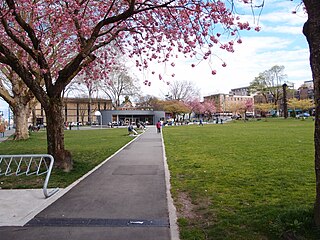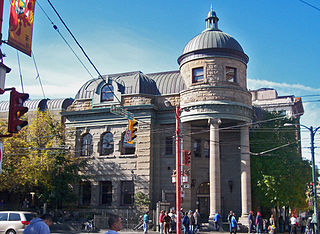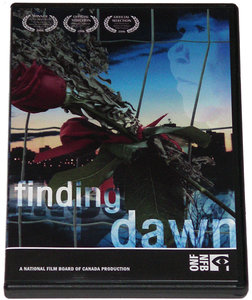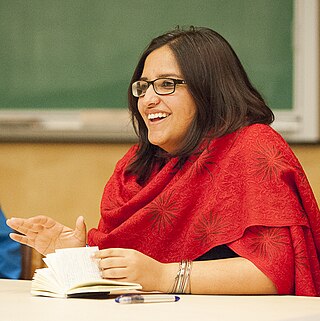
Gastown is the original settlement that became the core of the city of Vancouver, British Columbia, Canada, and a national historic site and a neighbourhood in the northwest section of the Downtown Eastside, adjacent to Downtown Vancouver.

The Downtown Eastside (DTES) is a neighbourhood in Vancouver, British Columbia, Canada. One of the city's oldest neighbourhoods, the DTES is the site of a complex set of social issues, including disproportionately high levels of drug use, homelessness, poverty, crime, mental illness and sex work. It is also known for its strong community resilience, history of social activism, and artistic contributions.
The North Shore of Burrard Inlet is a term commonly used to refer to several areas adjacent to Vancouver, British Columbia, Canada:

The Highway of Tears is a 719-kilometre (447 mi) corridor of Highway 16 between Prince George and Prince Rupert in British Columbia, Canada, which has been the location of crimes against many women, beginning in 1970 when the highway was completed. The phrase was coined during a vigil held in Terrace, British Columbia in 1998, by Florence Naziel, who was thinking of the victims' families crying over their loved ones. There are a disproportionately high number of Indigenous women on the list of victims, hence the association with the Missing and Murdered Indigenous Women (MMIW) movement.

Oppenheimer Park is a park located in the historic Japantown (Paueru-Gai) in the Downtown Eastside, Vancouver, British Columbia, Canada.

Carnegie Community Centre is located at 401 Main Street at the corner of Hastings Street, in the old Carnegie Public Library building in the Downtown Eastside of Vancouver, British Columbia.

Robert William Pickton, also known as the Pig Farmer Killer or the Butcher, was a Canadian serial killer and pig farmer. After dropping out of school, he left a butcher's apprenticeship to begin working full-time at his family's pig farm, and inherited it in the early 1990s.

The Missing Women Commission of Inquiry was a commission in British Columbia ordered by the Lieutenant Governor in Council on September 27, 2010, to evaluate the response of law enforcement to reports of missing and murdered women. The commission concluded its Inquiry in December 2012, and outlined 63 recommendations to the Provincial government and relevant law enforcement. The Inquiry itself received criticism from various civil society group and Indigenous communities, regarding its investigative structure, as well as, the lack of government action after the Inquiry to fulfill its recommendations.

Jim Chu, COM is a former-Chief Constable of the Vancouver Police Department (VPD). On June 21, 2007, Chu was named as the successor of Chief Constable Jamie Graham. On January 23, 2015, it was announced Chu was planning to retire after a 36-year career with Vancouver Police and he did officially do so on May 6, 2015, upon the swearing-in of his successor, Adam Palmer.
Jamie Lee Hamilton was a Canadian political candidate and advocate of aboriginal people, residents of Vancouver's poverty-stricken Downtown Eastside, and sex workers. She was an independent candidate for the publicly elected Vancouver Board of Parks and Recreation in the city's 2008 municipal election, after being controversially blocked from running on the Non-Partisan Association ticket.

Finding Dawn is a 2006 documentary film by Métis filmmaker Christine Welsh looking into the fate of an estimated 500 Canadian Aboriginal women who have been murdered or have gone missing over the past 30 years.
The Women's Memorial March is an annual event which occurs on February 14 in honour of the lives of missing and murdered indigenous women and girls (MMIWG) across Canada and the United States. This event is also a protest against class disparity, racism, inequality and violence.
The gentrification of Vancouver, Canada, has been the subject of debate between those who wish to promote gentrification and those who do not.
Trisha Baptie is a Vancouver-based citizen journalist and activist for the abolition of prostitution.

Harsha Walia is a Canadian activist and writer based in Vancouver. She has been involved with No one is illegal, the February 14 Women's Memorial March Committee, the Downtown Eastside Women's Centre, and several Downtown Eastside housing justice coalitions. Walia has been active in immigration politics, Indigenous rights, feminist, anti-racist, anti-statist, and anti-capitalist movements for over a decade.
Bud Osborn was a poet, community organizer, and activist in Vancouver's Downtown Eastside. Following his prolonged struggle with heroin addiction and alcohol dependency, Osborn became a founding member of the Vancouver Area Network of Drug Users and advocated for the creation of a legal supervised injection site. His poetry commented on poverty and homelessness in Vancouver.

Missing and Murdered Indigenous Women (MMIW), also known as Missing and Murdered Indigenous Women and Girls (MMIWG) and more broadly as Missing and Murdered Indigenous Relatives (MMIR) or Missing and Murdered Indigenous People (MMIP), are instances of violence against Indigenous women in Canada and the United States, notably those in the First nations in Canada and Native American communities, but also amongst other Indigenous peoples such as in Australia and New Zealand, and the grassroots movement to raise awareness of MMIW through organizing marches; building databases of the missing; holding local community, city council, and tribal council meetings; and conducting domestic violence trainings and other informational sessions for police.
Rosemary Georgeson is a Coast Salish and Sahtu Dene filmmaker and multi-media artist. Georgeson was born on Galiano Island in British Columbia, Canada. Her work ranges from film, theatre, radio to involvement in the culinary arts. Georgeson was the Aboriginal Community Director of Urban Ink Productions 2002-2011, and has worked with the company since its inception in 2001. In 2014 Georgeson was invited to the position of Aboriginal Storyteller in Residence at the Vancouver Public Library. Much of Georgeson's work highlights the unrecorded contributions that Indigenous women have made within the dying fishing industry. Raised in a fishing family on Galiano Island in the Southern gulf islands of British Columbia, Georgeson spent many years working and living on fish boats. An important component of Georgeson's work involves collaborating with other artists and community members.
The Astoria Hotel is a historic hotel turned into single-room occupancy accommodations located at 769 East Hastings Street in the Downtown Eastside neighborhood of Vancouver, Canada. The hotel was opened in 1913 as the Toronto House Apartments before becoming the Astoria Hotel in 1950. The main floor of the hotel serves as a bar and events space. The hotel is currently owned by the Sahota family.












